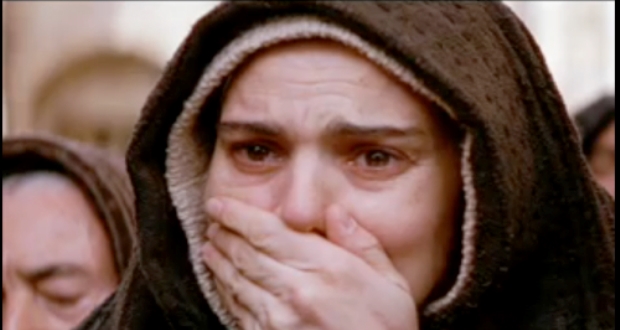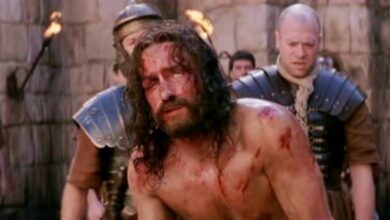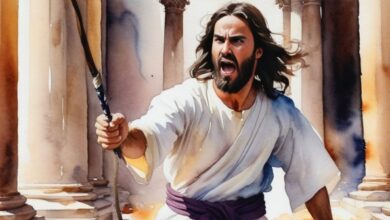Love Hurts, But Its Worth It

READ JOHN 19: 23-35
MEDITATION: Who can grasp the grief? The grief of Mary watching her son suffer? The grief of Mary watching him die? And who can grasp the grief of the son? The son who must see his mother mourn?
Do you feel the stark contrast of a death squad’s duty and a helpless mother’s horror? Every detail of this scene serves to magnify the son’s love for his mother in the last few moments he has breath. Jesus is in the middle of enormous pain and he is thinking about someone else. When in pain, he is still compassionate for others. His focus is not his own pain but the pain of his mother and the pain of his closest friend, John. He asks the two of them to take care of each other. He makes a new family.
Mary standing at the foot of the cross would have been the most awful and gut wrenching experience of her life, to see and experience his crucifixion on the cross. The nails that went through his wrists could have just as well gone through her wrists. The sword that pieced his side could have just as well been thrust through her side. Jesus’ pain was her pain. That is the way it is with mothers. I have known and watched many mothers as a priest, when their children are terribly sick and suffering. It is always the same: the mother totally feels the pain of her child, and Mary totally felt the excruciating pain of Jesus. Mary’s best friends and sister were there with her, but their love and compassion did not diminish the sadness and agony she was feeling.
See, Mary is a model for mothers in today’s world. Every child needs a great mother. There is no other occupation in the world that compares to quality motherhood from birth to death. As the book of Proverbs says, a fine mother is more valuable than jewels.
MULIER, ECCE FILIUS TUUS: “Woman, here is your son.” Here is our Lord, dying in agony, gasping for each breath. He sees his mother, the one who comforted him through all of childhood’s cuts and bruises, teases and taunts. When he was a boy he would run home to mother and instantly be wrapped in her protective, comforting mother-love. But now as he sees her at the foot of the cross, heartbroken, weeping, inconsolable, and his heart goes out to her. Rather than being consumed by an understandable concern for his own welfare, he is touched by hers. She is a widow – soon to be a widow who will be known as mother to that crucified criminal, Jesus. Life will not be easy for her. “Woman, here is your son”
Here is one I love, to love you, and for you to love; one who knows me; one who is my brother and who can speak of me; one who can hold you, comfort you, and honor you; one who shares your grief
Sometimes our parents misunderstand us or disapprove of decisions we make. Sometimes they can hurt us grievously. Jesus, too, had felt the hurt of misunderstanding from his family and friends. But whether they understand or even approve of us — whether we can even trust them at this point in our lives — we are told: “Honor your father and your mother” (Exodus 20:12). Christ-powered love can help heal the hurts from our families. We must love our parents.
“Here is your mother. Here is one I love, for you to love, and to love you; the one who taught me, the one who fed me, the one who wiped away my tears, the one who hugged me, the one who grieves with you.”
If we want to know what Jesus loves — who and how he wants us to love — how could he make it any clearer? Look closely! To the very end, even in his agony, Jesus acts with love to his mother. In his last moments, he looks to provide a home for her through “the disciple whom he loved” — a new family forged in the shadow of the cross. In addition, even as he goes through unspeakable grief himself, he demonstrates his support of those who face grief. He had wept in sadness at the death of Lazarus. He had been touched by the grief of the widow at Nain (LK. 7:11-16) and by the deep loss of the parents of a twelve year old girl (MK. 5:21-43). His concern for those who mourn is unmistakable.
While some of Jesus’ sayings from the cross offer us assurance and hope, the third word challenges us to share his love for those most vulnerable. “Behold, your mother.” And from that hour the disciple took her into his home.” Jesus’ death calls into existence a new community: a family of faith. This is a family tied together by their bond to the crucified Messiah. Jesus’ death is the beginning of a new family. This is a family where DNA and genealogy matter less than Jesus’ blood. This is a family called to care for the least, the last, and the lost. The marginalized and forgotten are the very folks Jesus’ family is called to embrace, protect and support.
How important are those that society often forgets? How important is it for us to honor our parents? How important is it to care for those who grieve? These are the ones to whom Jesus demonstrates his love in the moments just before his death. We have been charged by Jesus, at the very hour of his death, to care for one another and to reflect God’s love to each other. Each of us is entrusted to the other. And so Jesus calls us: “Behold one another.”
ACTION: MEDITATE ON THE STATIONS OF THE CROSS ON YOUR OWN TODAY. YOU MAY ALSO CHOOSE TO PRAY IT PERSONALLY OR WITH FAMILY AND FRIENDS AT HOME. KEEP IN MIND THE LOVE BETWEEN MOTHER AND SON.
PRAYER: Father, we see Jesus’ example of love and responsibility. As wonderful and loving as family relationships can be, they are often complex and sometimes hurtful. We ask you to help us sort them out. Show us how to love you at the same time we love our family members. Give us the divine wisdom that we need so that we can love as Jesus loves. In His name, we pray. Amen.






